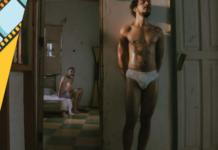
There are 4,696 professional athletes currently playing in the NFL, NBA, MLB, NHL, and MLS. There are 0 out players.
Those statistics flash on screen before the opening credits of an excellent new documentary about homophobia in athletics. Alone in the Game, an AT&T original film premiering June 28, explores the ongoing struggles LGBTQ athletes are facing at the professional, collegiate, and Olympic levels.
WATCH:
Homophobia is the main culprit, of course. It’s pervasive in the sports world and amplified by our sensationalist media. But it’s more than just homophobia. Athletics is drenched in toxic masculinity. The locker room environment, in particular, is corrosive. And there are very real risks for any athlete who dares to come out. Homophobia can reduce earnings potential, shorten a career, or even end one. It’s little wonder more athletes aren’t out.
The first openly gay man to play in a top North American professional sports league was soccer star Robbie Rogers, who took the field for the L.A. Galaxy in 2013. He appears in the new doc, as does the only other out gay man to play in the major leagues, the NBA’s Jason Collins.
They’re joined by a who’s who of LGBTQ athletes sharing their stories.
Skier Gus Kenworthy (everybody’s 2018 Winter Olympics husband) had dreams of coming out at the 2014 Games, only to be asked during an interview to name his celebrity crush and blurt out “Miley Cyrus” (since he couldn’t say “Jake Gyllenhaal”).
Professional soccer star Megan Rapinoe recalls living in terror that anything she did, even the way she ate pizza, might betray her homosexuality.
Trans triathlete Chris Mosier remembers how crushed he was when he had to sit out the national championship in 2014 because paperwork he needed to compete, an official clearance for his medical testosterone use, did not arrive in time.
Former Patriots lineman Ryan O’Callaghan talks about how he saw football as the perfect cover for his homosexuality — and also how he planned to kill himself as soon as his football career was over.
But at the heart of the film are the stories of three young men who have yet to achieve fame.
The first is unnamed. A closeted NCAA Division 1 football player — shot largely from behind, his voice disguised electronically — fears that his fellow players will reject him if he comes out. “Having just one person on this team that I was close with would mean everything to me,” he says.
The second, Riley Tindol, a gridiron star in high school, finds the pigskin is his ticket out of narrow-minded Billingsley, Alabama (population 140). Recruited by a number of football powerhouses, he accepts a scholarship to Vanderbilt University in Nashville. But being in the closet is keeping Riley from bonding with his teammates. It’s also wreaking havoc on his life off the field as the pressure of leading a double life pushes him to depression and despair.
We see the sensitive good ol’ boy with the team: practicing, during games, and in the locker room. But there’s also lots of moody B-roll of Riley at the stadium alone: a solitary ghost haunting the bleachers, sidelines, and weight room.
Trevor Betts is no ghost. A high-school student in New Jersey, Trevor is transgender — when we meet him he’s injecting testosterone. Veronica came out as Trevor at the beginning of 7th grade, flunking tests because he signed them “Trevor” and getting suspended for using the boys’ bathroom. But when we meet Trevor in high school, he’s on the wrestling team, supported by his coaches and teammates, and shockingly well adjusted.

For Trevor, athletics is an express lane to the masculine camaraderie he’s always craved. “If I didn’t do sports, I wouldn’t have any friends,” he says.
Trevor’s biggest struggle lies outside the locker room. His estranged father Richard, a conservative Christian, refuses to accept that his daughter is now a young man. In fact, he’s in court trying to prevent Trevor from legally changing his name — and railing against the “judicial and medical conspiracy” that he blames for Trevor’s gender switch.
Trevor is having none of it, laying it out for Dad in simple terms he can understand: “I’m transgender; that’s a fact. You’re bald; that’s a fact.”
Unfortunately, not everyone is as resilient, or as fortunate, as Trevor.
While Michael Sam is not interviewed in the film, his story figures prominently — as a cautionary tale. After his senior year at University of Missouri, the All-American came out as gay in 2014. He was drafted by the St. Louis Rams, a historic first for an out gay man, but cut before the season started. The film blames the homophobic media circus that surrounded Sam’s coming out — howls of outrage from conservative commentators after he was seen kissing his boyfriend during live coverage of the draft, endless questioning of other players about how they would feel sharing a locker room with a gay player — for the abrupt end to his promising career.
There’s also the disturbing story of Layana White and Haley Videckis, recruited to play basketball at Pepperdine University, a Christian school in Malibu. The two fell in love and were driven off the team after homophobic officials became suspicious of their relationship, questioning their rooming arrangements and even requesting their gynecological records. White and Videckis lost their scholarships and left Pepperdine, which they later sued (a case they lost last year).
This dark second act of Alone in the Game concludes with the revelation of suicide attempts by White and several others, including O’Callaghan and our boy Riley.
Nonetheless, the film is largely hopeful.
Directors Natalie Metzger and Michael Rohrbaugh have a gift for weaving narrative threads together. Individual stories come full circle: Mosier, who as a girl treasured an image of a bodybuilder torn from a magazine, gets his own body-affirming Kodak moment. And some stories intersect: Our closeted Division 1 football jock finds a player he can talk to.
The filmmaking is similarly expert. In fact, you’d almost say it was too slick if it weren’t so effective. Theatrical shots (staged) of Trevor wrestling are intercut with images of his dad in court assailing the judge with his wacko conspiracy theories. “Conquer and Prevail,” an exhortation from Vanderbilt’s fight song, becomes a visual leitmotif in Riley’s scenes, taunting at first, then triumphant. And Trevor becomes the author of his own story as several of his scenes are filmed YouTube–style, with him in his bedroom addressing the camera directly.
The doc is not without its flaws, however. Preoccupied with the ways in which toxic masculinity drives homophobia, it’s focused almost exclusively on men’s team sports (the last bastion of heterosexual exclusivity) — and on football in particular,
The film is subsequently very light on women. Megan Rapinoe functions more as talking head than profile subject, which means the only detailed personal story of female athletes is of White and Videckis’ struggle against Pepperdine.
The dearth of women’s stories becomes particularly difficult to ignore as a montage of LGBT athletes unspools near the end of the doc. Those featured can generally be divided into two groups: elder jocks who came out after their careers had ended (baseball players Billy Bean and Glen Burke, NFLer Dave Kopay, Olympic gold-medalists Greg Louganis and Caitlyn Jenner) and more recent heroes who have taken that courageous step while still competing (Welsh pro rugby player Gareth Thomas, Olympic gold medalist in soccer Abby Wambach, Olympic medal-winning British diver Tom Daley, and Olympic gold medalist and WNBA star Brittney Griner).
But busting those classifications wide open is the inclusion of two women trailblazers who came out in their prime — and long ago: tennis superstars Martina Navratilova and Renée Richards (who transitioned in 1975 and sued the United States Tennis Association when it would not allow her to compete as a women). For their stories to be omitted from the doc seems a terrible oversight.
Riley Tindol sums up the spirit of Alone in the Game when he says, “I play this sport because I wanna play this sport, and you couldn’t stop me if you wanted to.” Navratilova and Richards lived that defiant truth decades ago.
Alone in the Game premieres Thursday, June 28 at 8 pm on AT&T AUDIENCE Network (DIRECTV Ch. 239 and AT&T U-verse Ch. 1114). You can also stream it on DIRECTV NOW, DIRECTV, and AT&T U-verse apps.













